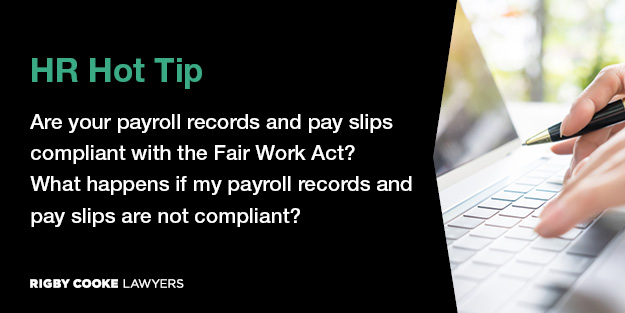Welcome to our series of HR interviews with Lawyer Monika Nosal who answers some of the most common questions asked by HR managers regarding employees’ legal entitlements.
All employers are legally required to keep accurate and complete records for all of their employees (e.g. wages paid) and issue pay slips to each employee. These obligations are designed to ensure employees are paid accordingly.
Under the Fair Work Act 2009 (Cth) (FW Act) and the Fair Work Regulations 2009 (Cth) (Regulations), employee records must:
- be in a form that is readily accessible to a Fair Work Inspector
- be in a legible form and in the English language
- be kept for seven years
- not be altered, unless for the purposes of correcting an error
- not be false or misleading to the employer’s knowledge.
Pay slips must be issued within one day of payment and must be in the form prescribed by the FW Act and Regulations.
Employees records, including their personal information, are private and confidential. The only people that are generally permitted to access them are the relevant employee, the employer, and relevant payroll/human resources personnel. Employee records may also be accessed by Fair Work Inspectors for the purposes of determining whether there has been a contravention of the FW Act or Regulations.
Employers who fail to meet their record-keeping and pay slip obligations may be issued with an infringement notice. Further, failing to keep accurate and complete records also increases the likelihood that any underpayment by the employer will be found to be a serious contravention of the FW Act, exposing the employer to significant penalties.
Employers obligations under the National Employment Standards, modern awards, enterprise agreements and contracts can be complex, overlapping, and at times confusing.
Employers need to familiarise themselves with and understand their legal obligations in order to avoid any possible claims by employees (both existing and former) and unsuccessful job applicants, as well as prosecution by the Fair Work Ombudsman. Under the accessorial liability provisions of the FW Act, employers and individuals such as directors and HR managers can be personally held accountable for breaching workplace laws in certain circumstances.
A HR Legal Audit conducted by Rigby Cooke can provide the HR function and, in turn, provide employers with comfort in knowing that they are legally compliant, or at least provide advance warning of any potential compliancy issues before they become problematic.
| Disclaimer: This publication contains comments of a general nature only and is provided as an information service. It is not intended to be relied upon as, nor is it a substitute for specific professional advice. No responsibility can be accepted by Rigby Cooke Lawyers or the authors for loss occasioned to any person doing anything as a result of any material in this publication.
Liability limited by a scheme approved under Professional Standards Legislation. ©2020 Rigby Cooke Lawyers |

